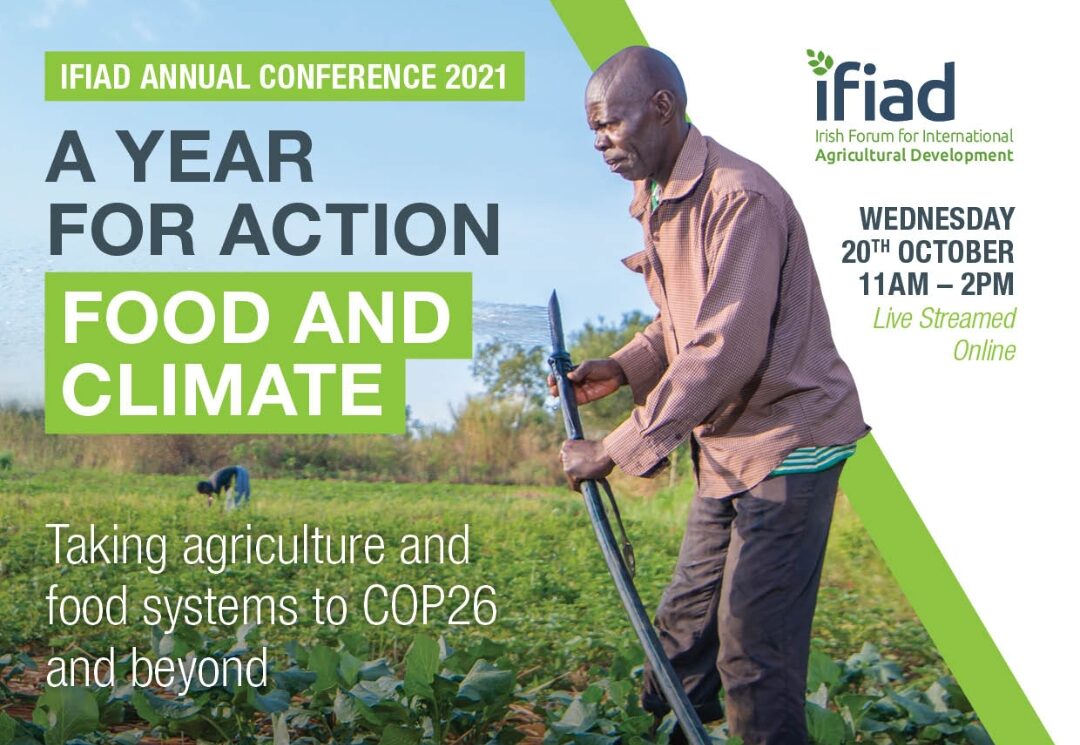A Year of Action: Food and Climate. The theme of the 2021 IFIAD conference echoes the most necessary debates and conversations of the year; speakers from diverse backgrounds and skills came together to communicate the need for action and much more. With a tremendous number of key issues discussed, the conference delivered knowledge and know-how on ways forward; from the food systems approach to the politics behind climate mitigation with food at the forefront of all challenges. Some of the key issues highlighted during the IFIAD conference were the inequalities and extreme poverty in agri-food systems, the stresses of the agri-food systems due to biodiversity loss, climate change impacts, resource degradation and GHG emissions, the impacts of COVID-19, hunger, gender inequality, ongoing malnutrition, and the lack of trust between different stakeholders. Many of the panel’s speakers show concern around the lack of action from many countries and how this may affect the future of a food systems approach at a global level, especially where politics is involved. Another interesting issue that is discussed is the need for mindset changes amongst stakeholders and as pointed out during the IFIAD conference, importance in this area is required; and hopefully, this resonates through leaders and ambassadors during COP26.
The speakers brought together their takeaways from the UN’s Food Systems Summit and the general consensus indicated that a transformational food-systems approach which works on rebuilding agricultural systems, supports primary food producers, and the integration of sectors and backgrounds for decision-making are some of the ways in which we can move forward with the challenges faced at global and national levels. The panel’s speakers also recognised and agreed upon the precise timing of the Food Systems Summit but also identified the need for further work required in many countries where COVID-19, political agendas, trust, and finance may further burden the new system of transition. A way forward was approached from different dimensions depending on the speaker’s background; however, each speaker resonates on the indistinguishable need for change from a food systems approach and how combatting key issues can be achieved by bringing together these differing backgrounds. As much as there was a general consensus surrounding the key issues, some speakers may have been more optimistic than others in terms of reaching certain SDG’s, whilst others had differing views of what’s required of stakeholders with little to no mention of achieving SDG’s.
The UN’s Food Systems Summit emphasised the detail of the key issues and addressed these issues with an inclusive food-systems approach which include coalitions, national dialogues, trade-offs, and all interconnected challenges as mentioned above. Further issues in this regard also come with questions around what happens now in terms of commitments made by countries and where did some national or sub-national dialogues go to. The Food Systems Summit and COP26 are events that have the greatest ability to change how stakeholders view food systems and climate change. One of the key aspects of COP26 will be the NDC’s. Discussions on this topic, especially in terms of Ireland’s NDC’s would have been a good contribution to the IFIAD conference, giving us insight on what to expect pre-COP26. Along with this, The Green New Deal will also form part of the COP26 conversation which was not mentioned during the IFIAD conference. With this in mind, let us not forget that the IFIAD conference covered many parts of Ireland’s work in the food systems approach. The IFIAD conference was brilliantly been able to envelop the issues that have been important during the Food System Summit and it is highly probable that these are the most important topics to be discussed during COP26.
With a number of key issues discussed at the IFIAD conference, the need for urgent action becomes more than clear. All stakeholders from all sectors and backgrounds need to come together and join the conversion and at the same time, work needs to be done in terms of changing mindsets towards a food systems approach. An essential part of keeping the momentum and enabling a transformation is to look at achieving goals in a holistic manner. As Tom Arnold discussed the need to approach food and climate together, Pippa Hackett also shares the importance of bringing the producers into conversations. These are essential to ensuring that key issues are addressed and it is an exciting time for this as we get closer to COP26 and our hopes and vision have been outlined during the IFIAD conference.
Further Reading
Canfield M, Anderson MD and McMichael P (2021) UN Food Systems Summit 2021: Dismantling Democracy and Resetting Corporate Control of Food Systems. Front. Sustain. Food Syst. 5:661552. doi: 10.3389/fsufs.2021.661552
Caprille, A (2021). United Nations Food Systems Summit. Process, challenges and expectations. European Parliamentary Research Service. Retrieved from: https://www.europarl.europa.eu/RegData/etudes/BRIE/2021/696208/EPRS_BRI(2021)696208_EN.pdf
United Nations Food Systems Summit (2021). Food Systems Summit Compendium. UNFSS. Retrieved from: https://foodsystems.community/food-systems-summit-compendium/
